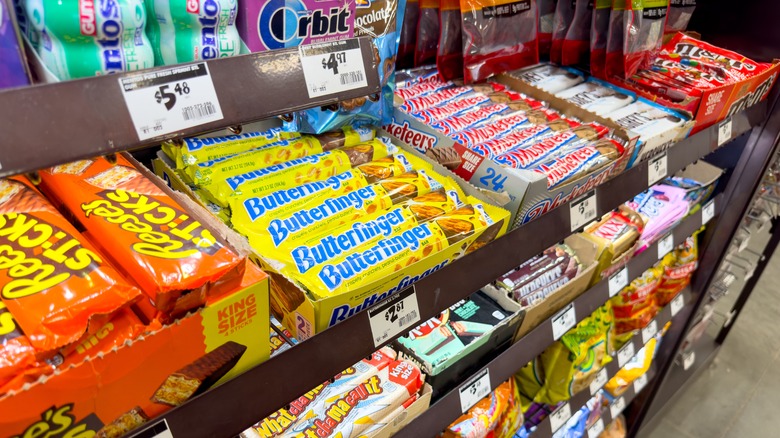Why You Should Budget For Impulse Buys At The Grocery Store
You're at the grocery store for a quick essentials run, armed with a list and a budget. But somehow, as you meander the long aisles, a dark chocolate bar, a fancy new snack, or an unexpected sale item finds its way into your cart. Sound familiar? Impulse buys are easy to write off as minor splurges, but they can add up faster than we realize. Still, instead of feeling guilty every time something extra lands in your cart, try strategically embracing it. Simply accounting for impulse buys in your grocery budget can make a huge difference.
While the amount spent on impulse buys has declined in recent years, Capital One reports that consumers still spend over $3,300 each year. Half of shoppers are likely to purchase something spur-of-the-moment while at the supermarket, which ultimately boosts a retailer's bottom line by more than 60%. With numbers like these, it's clear that impulse buying is built into our shopping habits, even when we aim to stick to the essentials. But by setting aside a small "fun" budget within your grocery plan, you can indulge in those little extras without straining your wallet — or feeling the sting of buyer's remorse.
Why budgeting for impulse buying works
Shopping mistakes happen at the supermarket mostly because we don't plan ahead or mindfully approach the process. Creating an impulse buying budget lets you account for small rewards without sacrificing control. Setting aside a portion that makes sense for your budget — whether it's something like $15 on a single trip or $50 a month — gives you the freedom to indulge without overspending in a blur. The act of picking up something new or unexpected floods our brains with dopamine, creating that feel-good rush. So, instead of denying yourself completely, which can actually increase craving and spending later, planning for these small extras helps keep impulses in check.
Dynamics like timing and store layout can also influence impulse buys. Since grocery stores are busiest on weekends, crowded aisles can lead to rushed decisions which make it harder to stick to your plan. Some suggest shopping on slower days or starting in low-temptation sections like the dairy aisle to avoid impulse traps. By setting a budget for fun purchases, you're embracing a balanced approach that acknowledges shopping triggers while keeping your budget on track.

